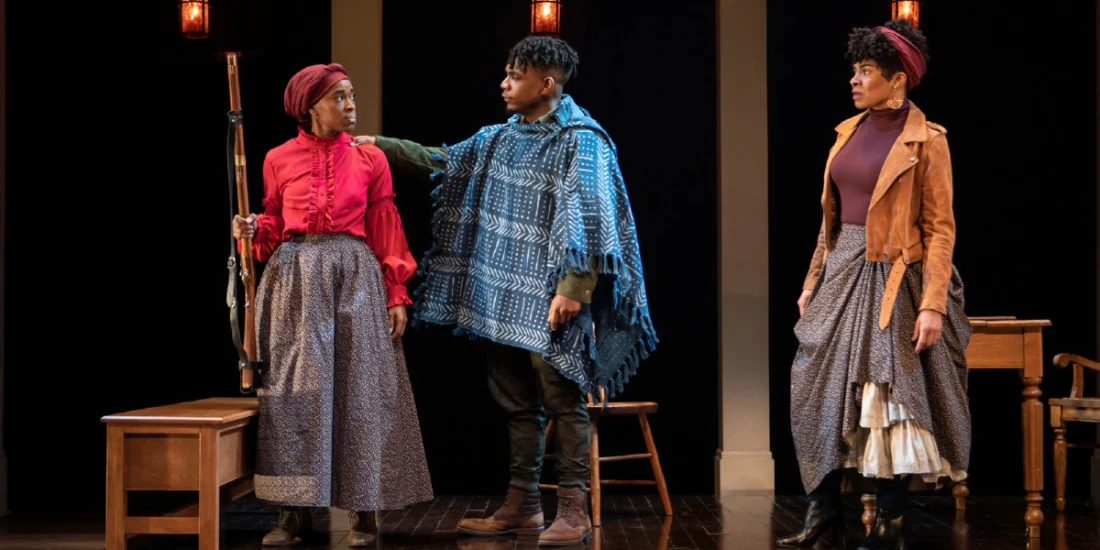'Confederates' review — the Union collides with university
Dominique Morriseau's Confederates is a spicy comedy that dissects the intricacies of racism that Black women are expected to endure. The recently opened production at Signature Theatre does so by framing the experiences of two Black women struggling through systems of white supremacy across two periods of time.
We open with Sandra (Michelle Wilson, queenly and sage), a Black, tenured political science professor calling for an investigation into a racist image — her face photoshopped on the body of an enslaved Black woman who has been forced to suckle a white baby — that has been left on her office door. Even as Rachel Hauck's white-pillared set frames it handsomely, Morriseau shows us there is something corrosive about this institution. After all, only a place ruled by white supremacy would require its Black faculty members to lead a hate crime investigation if they want a resolution.
Following this introduction, we are introduced to Malik (Elijah Jones, suave), a brilliant student arguing against a lower grade than he expected on one of Sandra's assignments. Though his comparson between plantation conditions in the modern-day workforce and slavery during the Civil War is apt, Sandra finds it underdeveloped.
This sequence feels like a wink to the audience that Confederates will soon dive deeper into that very comparison and reveal everything that Malik has neglected. It does so by transporting us back to the eve of the Emancipation Proclamation, when Sara (Kristolyn Lloyd, enthralling), an enslaved Black woman, is tending to her brother Abner (also Jones), who has run away from their plantation to join the Union army.
Sara wishes to join the fight for liberation, and her former mistress and abusive childhood "friend" Missy Sue (Kenzie Ross) soon enlists her. Missy Sue has returned home from a failed marriage with a bit of enlightenment about abolition, and she blackmails Sara into spying on her father, a general in the Confederate army. In addition to placing Sara directly in the line of danger, Missy Sue also makes clear that she is in lust with her ― all the while framing her displays of love as something they both want.
In a return to the modern era, Sandra proceeds with her investigation by lulling colleagues and students into revealing more than they realize. During one such discussion with her white teaching assistant Candace (also Ross), Sandra confronts the racial dynamics of white allies who assume that their proximity gives them authority. Candace hero-worships Sandra and feels she can freely criticize Malik's complaints on the grounds that she and Sandra are both fighting the patriarchy while negating how Sandra and Malik are Black people in the maw of white academia. This framing is uncannily similar to the arguments that white feminists made to Black women when asking them to vote for Hillary Clinton against Barack Obama.
Sandra shuts that down just as she rebukes her colleague Jade (Andrea Patterson, thrilling as always), who accuses Sandra of undermining her bid for tenure. Sandra believes Jade coddles their Black students, while Jade argues that hard-ass professors like Sandra, who insist that Black students work twice as hard for half as much, are as destructive as overt racists. Patterson also plays Luanne, a lighter-skinned enslaved woman who uses sexual favors to secure her position as a house slave — playing the only card she has. In that regard, she is like every other character, willing to do anything or use any argument she can to survive, even if that means pulling others down.
Director Stori Ayers keeps the storytelling tight and laughs in high gear. Rather than bury the script's humor, she uses it to remind us to laugh through our pain because if we don't, we may forget to breathe. Her direction also transitions wonderfully between timelines, as the characters all but saunter into and out of Ari Fulton's character-perfect costumes.
What stands out about the script, beyond its gorgeously scored points, is Morriseau's refusal to shove period language down our throats. Many of the ideas she presents did not exist in the 19th century, but she embraces anachronism knowingly and perfectly. In doing so, she engages with all sides of what tears a community apart while refusing to allow that dehumanizing one's own is acceptable.
Rather than lash out at individual players, she makes clear that the dog-eat-dog negotiations of academic institutions (the only place where many Black people can make it out of the hood) are just as insidious as the institution of slavery itself. Indeed, they perpetuate the very rules that kept Black people oppressed 200 years ago. The only question is, now that she has shown us, what are we going to do about it?
Originally published on
